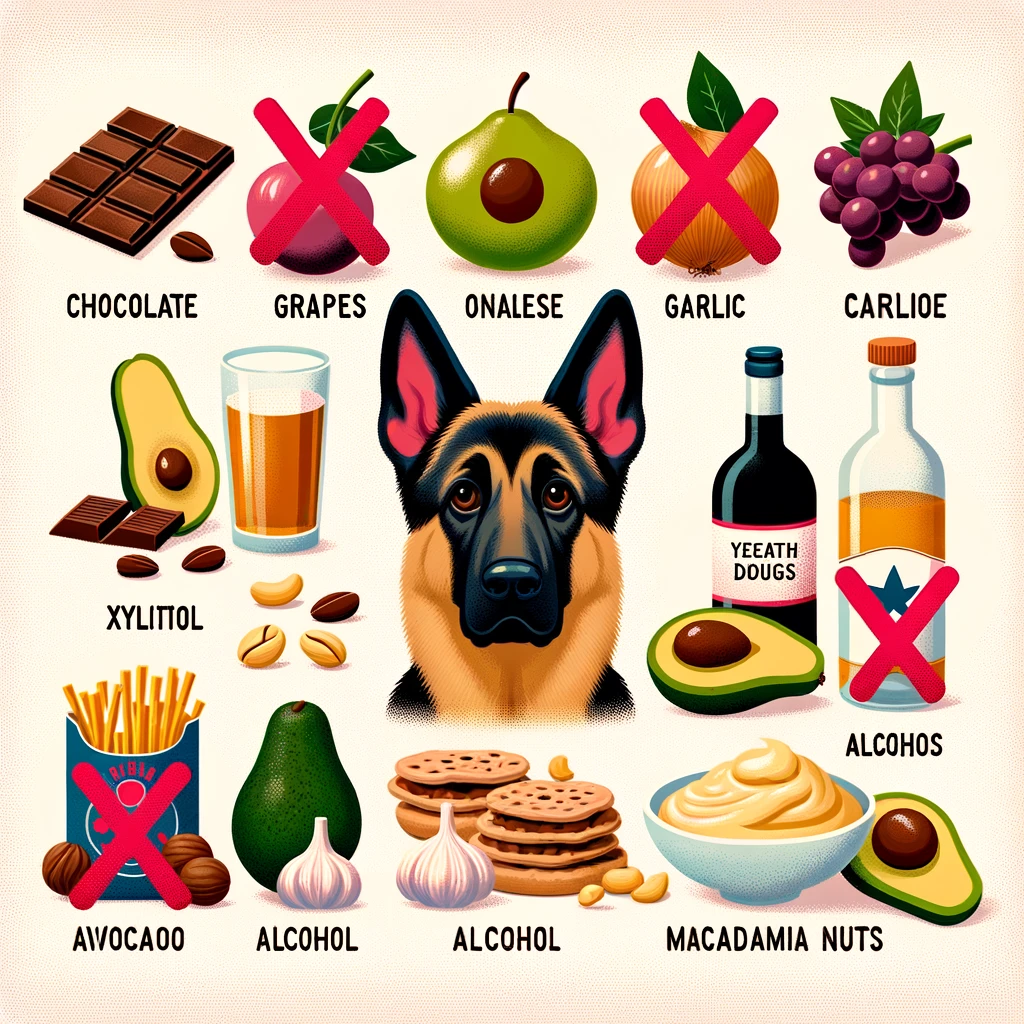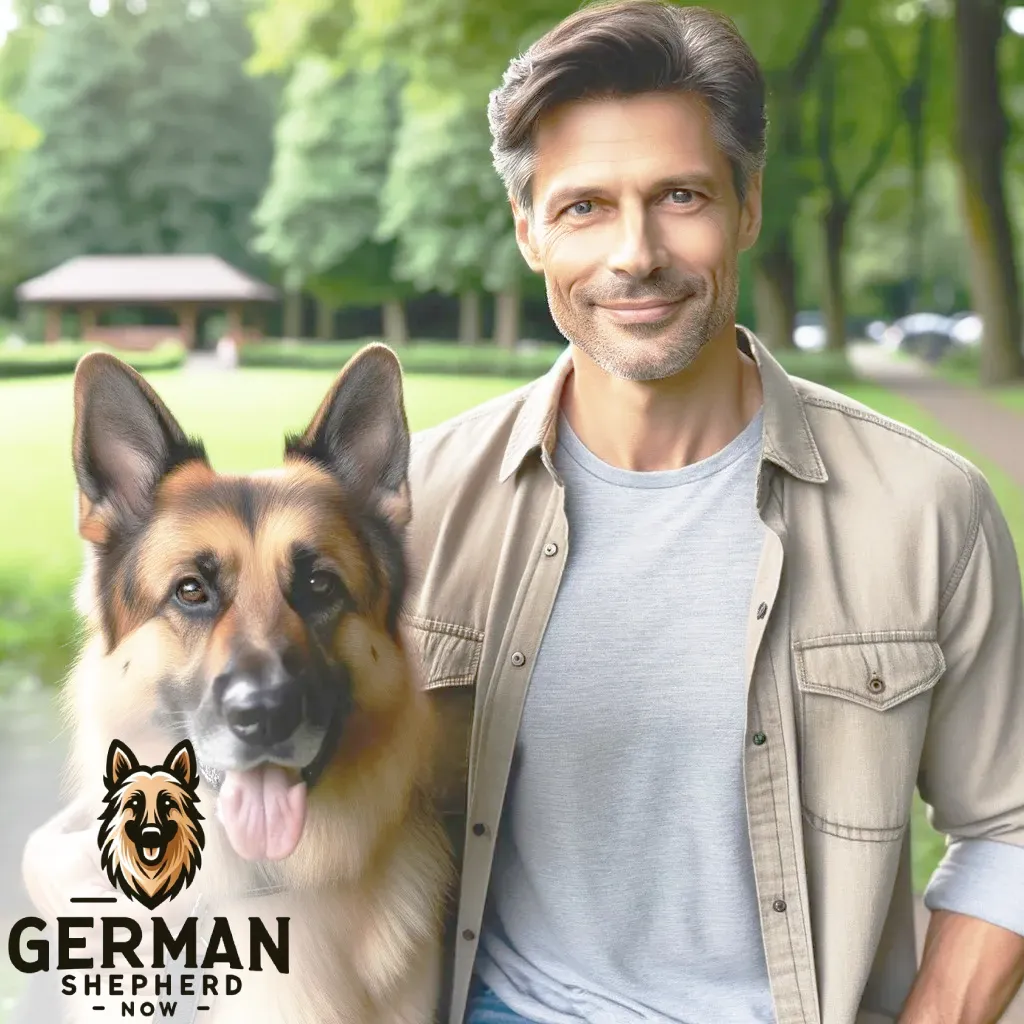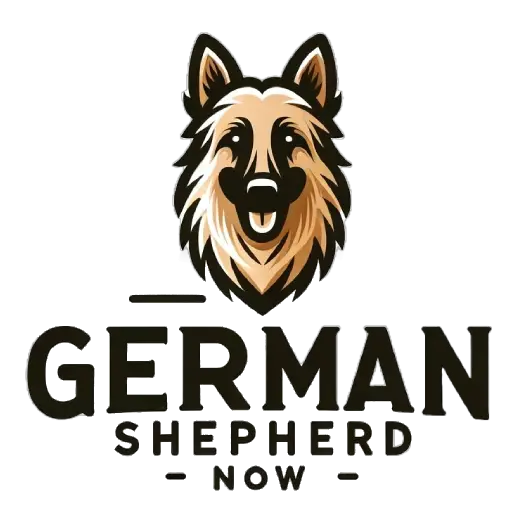50 Foods German Shepherds Should Avoid

German Shepherds should not eat chocolate, as it contains theobromine, which is toxic to dogs. Grapes and raisins are also harmful and can cause kidney failure in these canines.
Foods containing xylitol, like some peanut butter and sugar-free gums, are dangerous as they can lead to liver failure and hypoglycemia.
Lastly, onions and garlic can cause anemia in German Shepherds by damaging their red blood cells.
Foods to Avoid for German Shepherds
German Shepherds, like all dog breeds, have specific dietary needs and sensitivities. Certain foods that are harmless to humans can be dangerous or even fatal to these dogs.
As a responsible owner, knowing which foods to keep out of your German Shepherd’s diet is crucial.
Here’s a list of 50 foods that should be avoided to ensure the health and safety of your German Shepherd:
- Chocolate
- Grapes
- Raisins
- Xylitol (found in sugar-free gums and some peanut butter)
- Onions
- Garlic
- Alcohol
- Caffeine (in coffee, tea, energy drinks)
- Avocado
- Macadamia nuts
- Yeast dough
- Bones (especially cooked bones)
- Raw or undercooked meat
- Raw fish
- Garlic and onion powder
- Leeks
- Chives
- Salt in large quantities
- Artificial sweeteners
- Citrus fruits (like lemons, limes, and grapefruit)
- Cherries
- Peaches
- Plums
- Persimmons
- Fatty foods (like bacon or sausage)
- Spicy foods
- Dairy products in large amounts
- Corn on the cob
- Chocolate-covered espresso beans
- Nutmeg
- Almonds
- Walnuts
- Pecans
- Ice cream
- Raw eggs
- Raw potatoes
- Green tomatoes
- Rhubarb leaves
- Mushrooms (wild or certain varieties)
- Fruit pits and seeds
- Sugar in large amounts
- Currants
- Hops (used in home beer brewing)
- Mustard seeds
- Fried foods
- Processed foods high in salt and preservatives
- Coffee grounds and beans
- Tobacco
- Cooked bones (which can splinter)
- Nutritional supplements not intended for dogs
It’s always better to err on the side of caution and consult with a veterinarian before introducing new foods into your German Shepherd’s diet.
Some of these items may cause only mild digestive upset, while others can lead to severe poisoning or life-threatening conditions.
Toxic Foods for German Shepherd
Regarding German Shepherds, certain foods that are seemingly harmless to humans can be extremely toxic and should be avoided at all costs. Here are some of the most dangerous ones:
- Chocolate: Chocolate contains theobromine and caffeine, which are toxic to dogs. Even small amounts can cause vomiting, diarrhea, rapid heart rate, and, in severe cases, seizures and death. The darker the chocolate, the more dangerous it is.
- Grapes and Raisins: Surprisingly toxic grapes and raisins can cause acute kidney failure in German Shepherds. Even a small quantity can be life-threatening, leading to sudden kidney failure with a lack of urine production.
- Xylitol: Often found in sugar-free gum, candies, and some peanut butter, xylitol can cause a rapid release of insulin in dogs, leading to hypoglycemia (low blood sugar), seizures, liver failure, or even death. A small amount can be extremely dangerous.
- Onions and Garlic: These common kitchen ingredients can cause oxidative damage to red blood cells and lead to anemia. Symptoms might include weakness, vomiting, and breathing problems. Both raw and cooked forms are toxic.
- Alcohol: Even small amounts of alcohol, whether in drinks, syrups, or dough, can be dangerous. It can cause vomiting, diarrhea, coordination problems, difficulty breathing, coma, and even death.
- Caffeine: Found in coffee, tea, soda, and energy drinks, caffeine can be lethal for a German Shepherd. Symptoms of poisoning include restlessness, rapid breathing, heart palpitations, and muscle tremors.
These foods can have serious, potentially fatal consequences for German Shepherds. It’s vital to keep them out of reach and be vigilant about what your pet consumes. If you suspect your dog has ingested any of these toxic foods, immediate veterinary care is crucial.
Foods That Cause Allergies or Intolerance
German Shepherds, like many dog breeds, can experience allergies or intolerances to certain foods, which can have varying degrees of impact on their health.
- Dairy Products: Many dogs, including German Shepherds, are lactose intolerant. Consuming dairy products like milk, cheese, or yogurt can lead to digestive upset, including diarrhea and vomiting. While not typically life-threatening, regular consumption can lead to chronic digestive problems.
- Certain Proteins: Proteins from beef, chicken, and lamb are common dog allergens. Allergic reactions to these proteins can manifest as skin irritations, itching, and gastrointestinal issues. A protein allergy can sometimes lead to severe conditions like chronic ear infections or hair loss.
- Wheat and Gluten: Some German Shepherds may be allergic or intolerant to wheat and gluten. Symptoms can include itchy skin, ear infections, and gastrointestinal distress. Long-term exposure to these allergens without proper management can lead to more serious health issues, including chronic digestive problems and a weakened immune system.
- Corn and Soy: These are often used as fillers in dog food but can cause allergic reactions in some German Shepherds. Symptoms can range from skin rashes and hair loss to gastrointestinal upset.
- Eggs: While nutritious, eggs can be a source of allergies for some dogs. Symptoms might include skin irritation and digestive discomfort.
Recognizing the symptoms of food allergies and intolerances is crucial for the health of a German Shepherd.
Symptoms can vary but typically include skin irritations (such as excessive itching, redness, and hot spots), digestive disturbances (like vomiting and diarrhea), and chronic ear infections.
Long-term exposure to allergens can lead to more severe health issues, including anaphylaxis, a potentially life-threatening condition.
If food allergies or intolerances are suspected, it’s important to consult a veterinarian to identify the specific allergen and adapt the dog’s diet accordingly.
Foods That Are Harmful in Large Quantities
Certain foods might not immediately threaten German Shepherds in small amounts but can become harmful when consumed in large quantities. Understanding these is crucial to maintaining your dog’s balanced and safe diet.
- Salt: While a small amount of salt is essential for your dog’s health, excessive salt intake can lead to salt poisoning or hypernatremia. Symptoms include excessive thirst, urination, vomiting, diarrhea, and, in severe cases, seizures and death.
- Raw Eggs: Feeding raw eggs occasionally might not be harmful, but overconsumption can lead to biotin deficiency. Raw eggs contain avidin, an enzyme that interferes with the absorption of biotin, a B vitamin crucial for healthy skin and coat.
- Fat Trimmings and Bones: Fat trimmings can be a tasty treat in small amounts. However, excessive consumption can cause pancreatitis, a serious and painful condition. Similarly, bones, particularly cooked bones, can splinter and cause choking or damage to the digestive tract.
- Liver: The liver is rich in nutrients, but too much can lead to vitamin A toxicity, affecting a dog’s muscles and bones.
- Milk and Dairy Products: Dairy can cause digestive issues in lactose-intolerant dogs. In large amounts, it can lead to significant gastrointestinal distress.
- Raw Fish: Regular consumption of raw fish can lead to thiamine (vitamin B1) deficiency, resulting in loss of appetite, seizures, and, in severe cases, death.
Understanding the limits of these foods is key. While they may not need to be eliminated from a German Shepherd’s diet, moderation is crucial.
Overconsumption of these items can lead to various health issues, ranging from minor digestive discomfort to more serious conditions like pancreatitis or vitamin deficiencies.
Always consult a veterinarian to tailor a safe and nutritious diet for your dog’s needs.
Less Commonly Known Dangerous Foods
While some foods are widely known to be harmful to dogs, others are less commonly recognized but can be just as dangerous to German Shepherds.
- Caffeine: Found in coffee, tea, and some sodas, caffeine can be extremely harmful to dogs. It can lead to rapid heart rate, hyperactivity, tremors, and seizures.
- Avocado: The person in avocado can cause vomiting and diarrhea in German Shepherds. Even the pit poses a risk of choking or intestinal blockage.
- Persimmons, Peaches, and Plums: The pits of these fruits can obstruct a dog’s intestines. Additionally, the pit of peaches and plums contains cyanide, which is toxic to both humans and dogs.
- Alcohol: Even small amounts of alcohol, whether found in beverages, syrups, or unbaked dough, can cause vomiting, diarrhea, difficulty breathing, coma, and, in severe cases, death.
- Hops: Used in home beer brewing, hops can cause a rapid increase in body temperature and heart rate and can lead to death.
- Macadamia Nuts: These nuts can cause weakness, depression, vomiting, tremors, and hyperthermia in dogs.
- Yeast Dough: Before baking, dough can rise in a dog’s stomach, causing pain and potentially twisting the stomach.
Understanding why these foods are harmful and knowing their potential health effects on your German Shepherd is crucial for preventing accidental poisoning.
Preventive Measures and Safe Alternatives
To keep your German Shepherd safe from harmful foods, always monitor what they eat and keep dangerous foods out of their reach.
Train your dog not to accept food from strangers and to avoid scavenging. Regarding treats, opt for dog-safe fruits and vegetables like carrots, apples (without seeds), and blueberries.
High-quality commercial dog foods are formulated to meet a dog’s nutritional needs, so stick with trusted brands and avoid human food as treats.
Regularly consulting with a veterinarian can also help you choose the best diet for your dog’s health and needs.
Conclusion
Understanding and avoiding the 50 foods listed is crucial for the health and well-being of your German Shepherd.
Being a responsible pet owner means being aware of these dietary dangers and making informed choices about what to feed your dog. Always remember that what may be safe for humans can harm dogs.
If you’re ever in doubt about what to feed your German Shepherd, consult a veterinarian who can provide personalized dietary advice.
Ensuring your pet’s safety and proper nutrition is not just about love but also about informed and responsible care.

I’m Martin, and I grew up in the super cool city of Seattle. You know, the place with all the incredible mountains and forests? Yeah, that’s my playground!
Ever since I was little, I’ve been all about nature. I used to wander around the woods with a notebook, doodling all the cool plants and animals I’d find.
